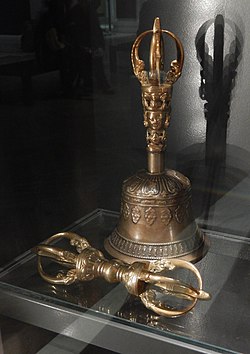Vajra: Difference between revisions
| Line 28: | Line 28: | ||
==Capabilities== | ==Capabilities== | ||
In | In {{wp|alloy|alloyed}} form, Vajra is stronger than {{wp|steel}} with only a third of its weight. Vajra is also conductive, making it a good choice for equipment designed to be used by electrokinetic individuals. | ||
==Limitations== | ==Limitations== | ||
Latest revision as of 10:49, 1 May 2024
This article is incomplete because it is pending further input from participants, or it is a work-in-progress by one author. Please comment on this article's talk page to share your input, comments and questions. Note: To contribute to this article, you may need to seek help from the author(s) of this page. |
 | |
| Colour | Reddish brown, golden brown, brownish black |
|---|---|
| Country of origin | Indraloka |
| Owner | Avatar Ministry of Mineral Resources Royal Amoury of Indraloka |
This article is about the Indralokan material. For the weapon, see vajra.
Vajra (Sanskrit: वज्र, IAST: Vajra) is a nearly indestructible material that crash landed as a meteorite from outer space, possibly the Svarga system or nearby systems into the Indian subcontinent. What little is found on Earth was used by the ancient Indians to create weapons and armour for the first human Avatar of Indra, a tradition carried out by the Marble Elephant Monastery to this day.
History
Capabilities
In alloyed form, Vajra is stronger than steel with only a third of its weight. Vajra is also conductive, making it a good choice for equipment designed to be used by electrokinetic individuals.
Limitations
The durability of Vajra, while very high, is still not unlimited and can be melted or damaged when faced with sufficient heat and force respectively.